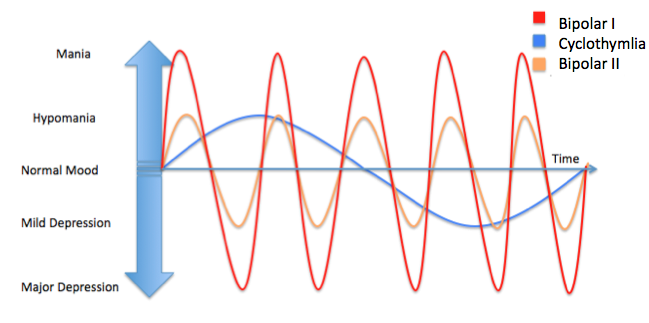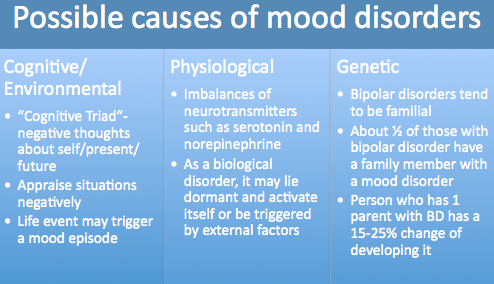Bipolar Disorders are mood disorders that have periods of mania or hypomania, and periods of depression. There are three different types of bipolar disorder.
Bipolar I Disorder is characterized by episodes of mania that are accompanied by episodes of depression. Mania is the the dominant feature
 of Bipolar I disorder. Those who suffer from Bipolar I often talk rapidly, sleep less than normal, are impulsive and take on many tasks.
of Bipolar I disorder. Those who suffer from Bipolar I often talk rapidly, sleep less than normal, are impulsive and take on many tasks.
To be diagnosed with bipolar I disorder, an individual must have one or more manic episodes OR mixed episodes. A major depressive episode may have occurred in the past or present but is not required for diagnosis.
Bipolar II Disorder is characterized by hypomanic and depressive episodes.
To be diagnosed with bipolar II disorder, an individual must have experienced one or more major depressive episodes with at least one hypomanic episodes.
Cyclothymia includes long term (at least 2 years) cyclings of moods between depression and hypomania. Hypomania is not severe enough to be considered a manic episode.
There are three types of mood disorder episodes that can be found in a bipolar episode:
1. Major Depressive Episode - five or more of the following must be present during the same 2-week period and represent change from previous functioning:

- *Depressed mood
- *Diminished pleasure/interest in almost all activities
- Significant change in weight or appetite
- Insomnia or hypersomnia
- Psychomotor agitation or retardation
- Fatigue or loss of energy
- Feelings of worthlessness or excessive guilt
- Diminished ability to think/concentrate or indecisiveness
- Reccurent thoughts of death/suicide
- at least one of the starred (*) systems must be present
2. Manic Episode - abnormally and persistantly elevated, expansive or irritable mood lasting at least 1 week (or shorter if hospitalitized). At least three of the following symptoms must be present:
- Inflated self-esteem or grandiosity
- Decreased need for sleep
- Extra talkative or pressured speech
- Flight of ideas; "mind racing"
- Distractibility
- Increase in goal-directed activity
- Excessive involvement in pleasurable activities that are dangerous
3. Mixed Episode - criteria for manic episode and major depressive episode in 1 week period.
4. Hypomanic Episode - criteria met for manic episode for 4 days, but symptoms not severe enough to cause impairment or hospitalization.
How is BPD treated?
The most effective anti-manic drug for treatment of bipolar disorder is lithium carbonate - a naturally occurring molecule. This has relatively severe side effects and is extremely toxic in overdose. Unfortunately, the amount needed to attain a response is close to toxic levels.
Drugs originally developed to treat epilepsy have also shown efficacy in treating bipolar disorders. They are mood stabilizers and work on the GABA neurotransmitter and are generally used to treat bipolar disorder by inhibiting neural activity.
Client compliance is a often a problem for those who are bipolar. Many enjoy the the initial phases of a manic episode and cease taking their medication. Using psychotherapy with medication has been shown to increase compliance.
© BrainMass Inc. brainmass.com June 30, 2024, 6:06 am ad1c9bdddf